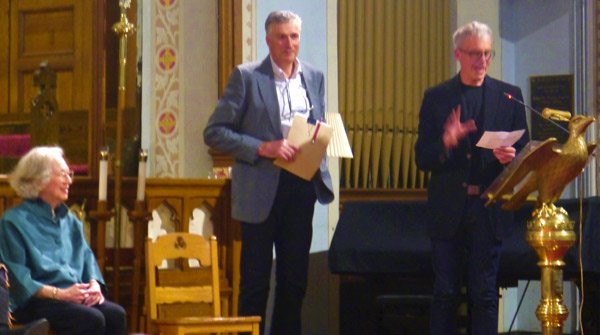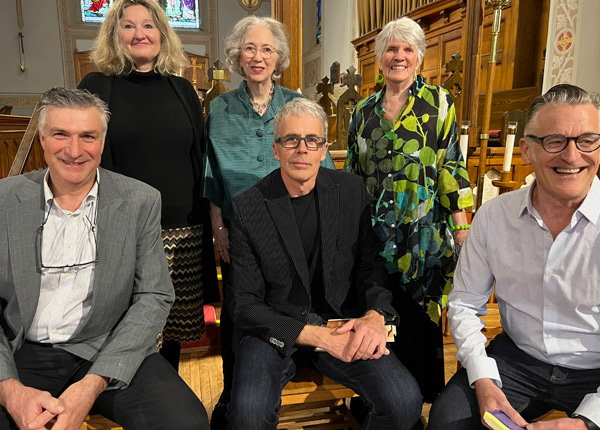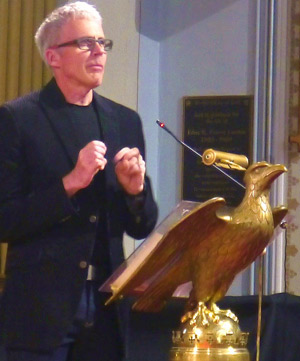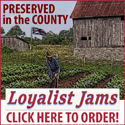Where the Falcon Flies soars to win 2024 County Reads debate; author will visit
Administrator | Apr 22, 2024 | Comments 0

Ernie Margetson, centre, listens to moderator Ken Murray’s question during the County Reads debate. – Sharon Harrison photos
By Sharon Harrison
Soaring to success as the winner of the 2024 County Reads Debate was Adam Shoalts’ book, Where the Falcon Flies, presented by County-native Ernie Margetson.
Margetson’s exploration of the title shares how Shoalts invites the reader to join him on an incredible journey as he walks away from his home on the shore of Lake Ontario, with little more than a backpack and a canoe, and makes his way, on his own power, to the shores of the Arctic Ocean.
“Never one to take a ride or take a shortcut, he did it all himself,” said Margetson. “He makes you consider the richness and vastness of this country, experience the view from his canoe or bushwhacking through the wilderness, and even if you know this would never be the trip for you, you can still be a passenger and enjoy the ride.”
“Beyond the adventure, there is a fascinating balance of history, geography and the experience the breath of the Canadian landscape. This is one of those books that would appeal to a wide audience and will stimulate your curiosity and desire to learn more about Canada and activate your patriotism and pride to live in a such a beautiful and magnificent country.”
Though winning first place, as determined by audience secret ballot, he was last to speak on a roster of five presenters defending their chosen titles in this favourite and much anticipated annual event now in its 15th year.

County Reads debators Karen Valihora, JC Sulzenko, Roz Bound, Ernie Margetson, moderator Ken Murray and Andrew Binks. – Liz Zylstra photo
Margetson was joined by Roz Bound, who presented Superfan: How Pop Culture Broke My Heart by Jen Sookfong Lee; Karen Valihora, defending Birnam Wood written by Eleanor Catton; Andrew Binks, presenting Care Of: Letters, Connections and Cures, written by Ivan Coyote; and JC Sulzenko, who brought to the stage, All the Colour in the World by CS Richardson.
The misty, drizzly evening (and yet more construction in the area) didn’t deter the good crowd – close to a full house – from making the trip to St. Mary Magdalene Church on Picton’s Main Street who once again hosted the event.
The County Reads Debate is the kick-off to the ever-popular annual County Reads Authors Festival held over several days every April, where Devon Jones, Prince Edward County Public Library board chair, noted that not only did the church waive the fee for use of the church for the event, but designated that the money be earmarked to support programming for the library.
Hosted by the Prince Edward County Public Library and Archives, Jones thanked the County Reads Committee of Barbara Sweet and Liz Zylstra who are with the library, and volunteers Janet Aston, Marilyn Leighton, Marlene Fraser and Alexandra Bake, along with long-standing moderator Ken Murray.
Each presenter was allotted five minutes to convince the audience why their chosen title is the book everyone must read (and vote for), and where, if they prove successful over the other four competitors, they get bragging rights of holding title to the esteemed honour of County Reads Debate winner for an entire year.
After the main presentations, a question was posed by Murray to each (the same question), to which each must answer on the spot. This is followed by a one final minute pitch for each, on why the audience should vote for their particular book.
Murray acknowledged the braveness of participants, noting it was not necessarily an easy experience for most to be up on a stage in front of several hundred people, and certainly not when posed with a random question.
“You have all probably somewhere in the past had that experience, that terrifying experience, where you have come up before the classroom with your peers and talk about and do a book report and it was awful and maybe one in 15 of you loved it, one out of 20 or 30, but for everyone else it was awful,” Murray said. “Everyone here is volunteering their time and to talk about their book and to be put on the spot (with this question) requires much appreciation.”
Audience members vote by secret ballot, where in swift order, the winner is declared before the evening wraps up.
For Adam Shoalts’ fans, or anyone intrigued to meet the Where the Falcon Flies author and hear more about his latest book (and his new-found County status), a late-breaking announcement at the event informed Shoalts will be coming to Picton branch library for an author talk on May 23 at 7 p.m., where he will also present his slides from his wondrous voyage.
While tickets will be available at the door, word on the street is this event will be a popular one, so the recommendation is to obtain tickets ($15 each) in advance to avoid disappointment, by visiting or calling any library branch or visiting the library’s website events page
And just a reminder that all books covered in the great debate are available at the library to borrow, or can be purchased at Books and Company in Picton.
* * *
Below are highlights of each presenter’s presentation of the title they defended in the 2024 County Reads Debate – why they chose it, what resonated most, and what connected them to the title they brought forward.
ANDREW BINKS: Care Of: Letters, Connections and Cures, written by Ivan Coyote
The first presenter of the evening, Andrew Binks, championing Care Of: Letters, Connections and Cures written by Ivan Coyote, was the only presenter to hear the chimes of Murray`s warning bell as he went a little over his allotted minutes, speeding up his offerings toward the end so as to fit it all into the time slot. Binks is the author of two novels, fiction and non-fiction, and he mentors for the University of Calgary and the Writers Union of Canada, and teaches at the Prince Edward County public library.
“I was first attracted to Ivan Coyote’s book, Care Of, as memoir in the form of letters, in this case to fans and followers, I was intrigued by how much letters can reveal about an author,” said Binks. “In this world of text messages and caller ID, where modes of communication are limited to a few words, and honest to God, a letter can be so refreshing.”
He says, the letters in Care Of can come in forms from emails, to notes scribbled on paper and shoved under a windshield wiper. “I thought for those in the County, retirees, budding artisans, who are living the second or third life, that talking about letter writing was a form of literary expression and memoir to inspire you to this book.”
“Read it, and then sit down and either pull out that shoe box of letters from long-forgotten flames or family members and re-think what you do with them, perhaps even answer them, even if the recipient is no longer to this earthly world, rather than have them gather dust.”
Binks talks about being in for an awakening as he is introduced to a writer who has dedicated their life to sharing and encouraging other people’s struggling, like doing shows, talks and readings. “I never set out to be a queer author,” said Binks, quoting Coyote, “yet they touched thousands of lives, a humbling example, but all of these accomplishments are accompanied by a generosity of spirit and some living their truth and as a result, helping so many others and thriving publicly so.”
“As Ivan says, I wish we had more words.”
“The author, Ivan Coyote, non-binary, transgender author, presenter and inspiration took me by the hand and escorted me in one of the most generous and nurturing ways I’ve ever known an author to connect with a reader into an intimate and lovingly-guided tour through the trans-gender world in the many angles in the trans-gender experience.”
He says, Care Of fills in the grey areas, and “paints a picture of the reality faced by questioning family, it is a wake-up call”.
“Whether I am queer or not, it is my responsibility to be an unquestionable ally and member of the LGBTQ+ family,” he said. “Care Of has reminded me of the day-to-day experiences of being trans-gender, those willingly or not, being dragged into the life of drama. Other people’s tantrums, political polarization and judgement, in this case, love and support by one strong spirit win the day.”
Binks says, for adults with transgender families, this book is an introduction into the sensitivity required to understanding a youngster who is grappling with identity and how many of those among us educate, parents, grandparents, who bear responsibility to listen and offer support.
Binks explained how he was attracted to the macro with this book.
“Our memoirs are prompted by the style and structure of the possibility of telling stories to the ancient form of letter writing.”
He said, Care Of is an example of dedication and commitment by a writer to their audience, their sense of purpose and their commitment to their crowd in the midst of life-altering events, such as the pandemic. “It is also an example of a brave dedication to a cause which I would say is the macro.”
When asked by the moderator if he had one question to ask the author who is sitting in front of him what would it be, as Binks’ answer came in the form of how struck he was by the generosity of spirit and his words to these people, to these fans.
“How do you do that? It’s like you are channelling something that is so genuine and honest, there is no holding back in your love and kindness to these people who have written you, once or maybe a couple of times,” he said. “I am envious of your generosity of spirit. Where do you find that, are you afraid of that moment in time?”
ROZ BOUND: Super Fan: How Pop Culture Broke my Heart, written by Jen Sookfong Lee
Author and poet, Roz Bound has given local writers opportunities to be heard at open floor in Wellington since 2001. She has given regular workshops here and in England and speaks often on creativity, aging and the strength of her own spirit, noted Murray.
A recent award-winning book, Aging Consciously, Dying Awake, evolved from a doctoral dissertation and she is currently working on tying up threads, her next book a collage, a memoir and poetry.
Bound started off by saying from a title you’d expect Lee’s book to be likeable, but she notes how it is not a quick, easy read and is a book that doesn’t flinch away from the everyday effort of life.
To quote Lee: “I write into the hard thing so I can identify with it and I can learn from it, it checks all the boxes for me without straining my arthritic hands”.
In what she calls a memoir in pieces, Lee shows how pop culture saved her from her otherness. It forced her to answer the question, where are you really from when belonging to her is a myth, outlined Bound.
“Her essays tell how the image of normal is thrust upon us. Maybe you think pop culture doesn’t play a part in your life, maybe you’re thinking of Justin Bieber or rap music that has got nothing to do with me, but do you remember the music you danced to with your first crush?” she enquired. “Do you remember where you were when John Lennon died? Who was the first movie star you idolized? Mine was Peter Ustinov, of all people. But think how those people and events influenced you.”
“Fashion becomes military around wartime, movies today are full of extraterrestrials now that extra secret information is about to be released. Back in the ‘60s, Elvis and Pat Boone were famous at the same time. Whoever you liked most would have showed up in your clothes you wear, your behaviour, your conversation, even your friends. Not just in music.”
Popular culture affects our lives, she says, whether we are aware of or not.
“Lee said that she dissected it, picked-up pieces that she could learn from or use in her own life that was the glue that held her together. Confused over cultural, national, racial, sexual identities, it helped her fit in Canada.”
The ideal parents on TV were not hers, but she felt closer to them than her own, Bound said, where Lee writes “Jamming a piece of pop culture into the axis of my life seemed like the best thing to do”.
When Taylor Swift was in the headlines, did you research why she is so popular? Bound asked. “Did you listen to her music, decide if you liked it or not, or did you ignore it and play Moon River, remember that first dance.
“Think of the latest revelations about the hip-hop industry. Keeping up with pop culture forces us to look at our values and naiveté and denial of truth and to make our rights a conclusion about a presence I guess which affects whether we like it or not.”
Lee uses pop culture to explore a brief and female rage, firmly in her mid-life; she is a modern-day Virginia Woolf looking for a room of her own as she studies the history of those creative women, states Bound.
“Super Fan is not light, it is required reading.”
KAREN VALIHORA: Birnam Wood, written by Eleanor Catton
The third presenter of the evening was Karen Valihora who teaches at York University and is the new publisher, along with Chris Fanning, of the Picton Gazette. “She states that she has too many kids, and considered forcing them to come here tonight, but in the end, choose to force them to stay home,” said Murray. “Home alone,” added Valihora.
Birnam Wood opens with a real estate listing, A former sheep station in a mountain valley, almost 400 acres, being marketed to developers as a perfect sub-divisions opportunity. “Conflicts between locals and newcomers, and newcomers who want to look like locals, feature in the background of the plot, even though the novel is set in New Zealand, it constructs a very familiar landscape,“ Valihora began.
She says the novel leads us where we are, its characters examine Google maps and satellite views; they’re constantly checking their phones and other people’s Facebook pages. “Two close friends survey each other by tracing on an app for location of each other’s cell phones: like the mirage map in Harry Potter, the app allows you to see exactly where someone is at any given moment.“
For different reasons, she notes how a number of people converge on the remote sheep station, the first a leader of a radical gardening collective that sometimes illegally grows vegetables, wherever it can find some active land along roadsides and fence lines, beside off ramps, in junk yards, on those narrow strips of grass next to the gas stations.
“The leader is a stealth operator, she gardens on private land and steals supplies from unlocked garden sheds, but only from wealthy neighbourhoods.”
She has discovered this country estate, the sheep farm is unoccupied through her satellite map surveillance, and she thinks it would be a great place for her group to hunker down and grow stuff on a scale they have never been able to imagine before, and totally unbeknownst to the owner.
“The novel opens with a major landslide that has cut off a nearby mountain pass and it won’t be open for months and she hope the shut road means the house owner won’t be there until the pass is clear,” explains Valihora. “So she goes to investigate and there she meets Robert Lemoine, a billionaire who builds surveillance equipment, very high-flying drones, the kind used in military operations, his company is called Autonomo.”
Lemoine has secretly purchased the farm because he wants access to the vast national park that is just next to it.
“We discover that the landslide that has shut the mountain pass was caused by Lemoine. He is secretly drilling deep in the national park, unknown to the New Zealand government or anybody beyond his mercenaries,“ she continues. “He is mounting a massive operation to extract from deep underground the rare earth minerals essential for our cell phones and TV batteries. The project will make him the richest man in the world, not just a trillionaire, but a sought-after resource. He hopes that if it became known he illegally extracted rare earth minerals from a national park in New Zealand, nobody would care.”
Catton’s novel explores the moment in which we live, a moment created through technology and the internet, says Valihora. “She suggests that as soon as we are plugged in, we are all subject to compromise and forces if you are familiar with the language of the marketplace and the way it commodifies experiences. The surveillance technologies of the internet inflect the ways we think and act, and relate to one another even more pervasively“.
“At the same time, Catton situates human scale activities, like gardening and considering one’s ethical principles and gossiping about the neighbours and real estate, within massive local forces that are far beyond human scale, out of our range and knowledge and utterly beyond our control.”
Valihora explains how Lemoine personifies the forces of local capital: they put a human face on corporations that operate far beyond human scale.
In response to Murrray’s question about what she would ask the author if she had one question to pose, she replied, ‘When does the movie come out?’ She speaks to the landscape of New Zealand, the national park and the landslide and the mountains, as well as the city of Christchurch where it all starts. “I am dying to see a movie set in New Zealand and I think this would make a very scenic, photogenic, action-packed, but also very interesting and intricate thriller.”
“The reason I think this novel is a masterpiece is because its form mirrors its content,“ she said. “If it starts as a novel of the 21st century manners, an in-depth examination of how we live now, it also explores the forces that turn it into a thriller. A page turner with a momentum that totally overtakes and lays wake to human scale, thought and principles as it moves relentlessly towards catastrophe – I can’t say anymore than that, can I?”
JC SULZENKO: All the Colour of the World, written by CS Richardson
JC Sulzenko’s award-winning poetry has appeared in anthologies in journals, in print and online, either in her own name or as A. Garnett Weiss, said Murray, where she is active in writing communities in the County and Ottawa and Toronto,
Sulzenko describes this slim volume of finalist for the 2023 Giller Prize as not middle-of-the-road or a middle of the pack read, but a front-runner fiction of the highest quality, “unconventional, innovative and infused with culture, history and art, and, of course, colour, portrayed sensually”, saying it speaks volumes. She describes it a compelling story told with skill in unexpected ways, a book she couldn’t put down and one read in one go.
“Second time around, I slowed down and indulged my curiosity, exploring each commentary related to pivotal moments in history, the arts, science, literature and culture,” Sulzenko said. “They serve the narrative seamlessly to introduce turning points that raise or calm attention the writer builds or stands.“
Within its 195 sections, each one less than a page in length in a book without page numbers, where the novel embraces such enigmatic surprising depth and humanity, sometimes with humour, love, joy, memory, beauty, loss, grief, survival, guilt, mental illness, fear, connection and compassion, forgiveness and healing, she said.
“While I am really desperate to share the story with you, you should read it for yourselves. What I want to reveal is this. The novel represents an odyssey the main character must experience, he’s a comedian every man whose given name Henry, readers only learn about only halfway through the book.”
She goes on to explain how the author chooses an unusual narrative voice, the second person (you), which creates an intimacy between the reader and Henry whose dialogue with himself unfolds the story.
The book may appear small, but nonetheless, it is an epic she says, covering the sweet and times through the first and second World Wars and into the 1960s and was set in London, France and Italy.
“Richardson shows his skill and attention on every page, the pacing is flawless, at times its gentle and others, harrowing. There is nothing extraneous, every word counts, every colouring and cue engaged the imagination, whether describing the first kiss, her lips softer and wetter than you could have ever thought possible, like her nail polish, vermilion, oh so vermilion. Or Henry’s panic attack on VE Day, the visions, the terrors, the colours, beginning as dull sepia only to drain to blacks and whites, there are no lively pastels to divert your attention, no comforting hues, all is blinding glare and unnerving shadow.“
Sulzenko notes the cast of characters is spare, yet developed fully, describing All the Colour in the World as a work of art.
“It pays homage to the Oscar Wilde notion that life imitates art far more than art imitates life, how art helps us see and appreciate life differently,” she said. “In my view. the novel’s also a jewel and it’s as rare as a Fabergé egg which opens to delight with its surprise intricacy and artistry, its unique.”
She concludes by expressing how the novel engages both heart and mind, how it surprises, intrigues and satisfies, “read it for the story, that’s more than enough; read it for the facts, the tidbits that illuminate and illustrate that inform the story and its characters because you will care about what happens to them. Read it for the storytellers craft, read it in a day to escape the tyranny of social media and the internet, but above all, read it and let yourself wallow in the colour palette that gives the book its soul, their names almost like a mantra, lemon, gamboge. ultra marine, meridian, cobalt, Egyptian blue, umber, fallow, ink, obsidian, and you, like me, may see life with different eyes having seen all these different colours in the world.”
ERNIE MARGETSON: Where the Falcon Flies, written by Adam Shoalts
Ernie lives with his family on a farm on the outskirts of Melville on Consecon Lake and has a keen interest in geography, history and the natural environment. Educated in engineering and architecture, he is also pursuing a passion for lifelong learning and active citizenship. “He’s travelled extensively and recounts some of his main adventures as experiencing a massive earthquake in Chile, and exploring the Nile river in the Mediterranean at its source in Uganda.”
Last, but certainly not least, Ernie Margetson said as a non-fiction book, he feels it’s important to know about who wrote Where the Falcon Flies.
Adam Shoalts is one of Canada’s greatest living explorers: he’s a writer, a historian, archeologist, and geographer, notes Margetson. He was elected a fellow of the Royal Canadian Geographic Society for his extraordinary contributions to geography. He holds a PhD from McMaster University where his research examined the influence of Indigenous fur traditions on the fur trade.
He is the author of numerous books, many of which chronicle various wilderness expeditions, including a 4,000 kilometre trip across the Arctic. Written in 2023 his latest, Where the Falcon Flies, chronicles a trip that began on April 24, 2022, when Shoalts set off from the Great Lakes upon seeing a pair of falcons on the shore of Lake Erie.
“Shoalts was reminded of his previous trips in the Arctic where the peregrine falcon really caught his imagination. It’s a monarch of the sky, the fastest animal on earth,” explained Margetson. Shoalts proposed to follow the same route as that migrating bird. The north-east route along the Great Lakes, up the St. Lawrence river, through to Nunavik, which is on the east side of Hudson Bay, northern Quebec.
“The Arctic was not just any wilderness, without any connection to southern Ontario, but a vital part of the migration route for many birds that fly north each year,“ he said, and a major theme of the book.
“We often don’t think how the remaining wild places in southern Ontario are connected to the vast wilderness in the Arctic, but migrating bird species that utilize the north for their habitat also require natural areas along their route, including the south where we live,” said Margetson. “You will find a connection to the efforts here in Prince Edward County to protect priority habitat through the migratory range, such as the South Shore.”
Margetson says, many may think of the Canadian north is so immense, such a migrant wilderness that it is beyond anything we can imagine, resilient impact by the sheer fact that its critical mass, but the near and far north is being seriously disrupted by climate instability.
“Despite our image of an untamed and inexhaustible nature reserve, there is an absolute obligation to reduce our impact and protect what is left of the Canadian wilderness,” he said. “As an explorer, Shoalts maintains we are losing the natural world faster than we can even explore it. This is unquestionably a journey that most would say is impossible or daunting to even imagine.”
We can’t forget about the Great lakes portion of the first third of his trip appears Niagara Falls, the St. Lawrence Seaway, the ports of Toronto, Montréal and Quebec, and there are many others that he had to pass by navigating a Great Lake in high winds and waves, he says. “Reading how he navigates this part of the story is very interesting because we can all relate, perhaps most of us live here.”
Margetson talks about how Shoalts narrates his journey with a lightness and humility regarding his challenges and how he overcame them. “He often reiterates how to breakdown such a challenging undertaking to make this progress manageable and achievable. Only think about one day at a time he says, even one step at a time, one paddle at a time, and you can get through a journey that took him three months and it was 3,400 kilometres.”
He suggest readers can draw many lessons from this undertaking that Shoalts took and apply it to their own life, “it certainly resonated with me“, and, “even if you cannot imagine such a trip as this, reading about this journey can still be satisfying for an armchair explorer: it can inspire us to learn more about the unique regions of Canada, our geography, our history, and observe it through the eyes and pace of someone that is paddling and hiking through the woods. We can gain insight into the benefits to being connected to wild places and acknowledging that we share the world with all life.”
Where the Falcon Flies is an engaging narrative, he says, “A memoir of a journey mixing details of the physical challenges of such a trip, with the undertaking and satisfying sprinkling of information about Canada, perhaps learning more about this great country and how to respect it.”
In response to Murray’s question on one question to the author, Margetson said he would ask Shoalts where he got the bravery to undertake such a journey and overcome all the obstacles.
“It’s truly amazing what one person did here and here’s an example on the Great Lakes, he’s trying to get through the port of Montreal, which is about 10 kilometres long, with a lot of ship traffic, he’s jostling around in a canoe with massive ocean liners, then the black flies,“ adds Margetson. “Think about it, he sets off in May and he’s hiking up the mountains on the north-west coast of the St. Lawrence estuary, which by the way is the largest estuary in the world, and just dealing with the relentless mosquitoes and black flies, and he hikes all the way pretty from much from Quebec City and just north.”
“It’s an amazing journey and there have been numerous questions that you could ask someone about a journey like that, like where do you find the bravery to take on such a journey?”
Filed Under: Arts & Culture • Featured Articles • News from Everywhere Else
About the Author:


































